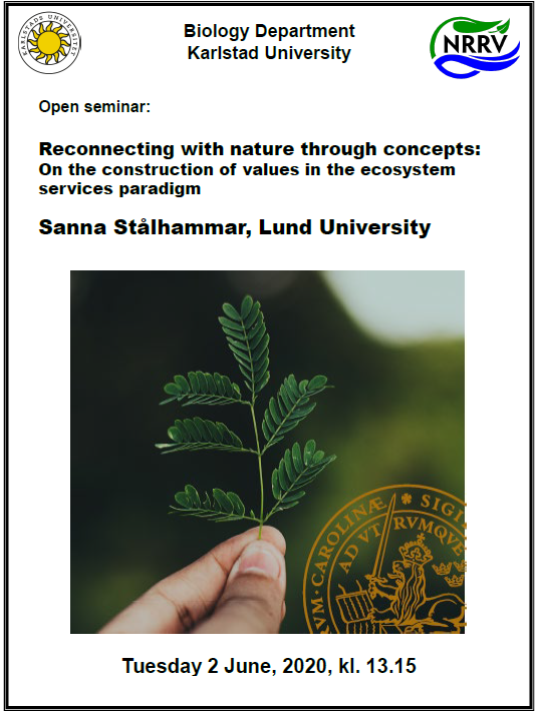24
SEP 2020 
Next week on Tuesday 29 September kl. 13.15 RivEM professor John Piccolo will hold a seminar entitled “Nature’s contribution to people and peoples’ moral obligations to nature”. He says: “In the seminar, I will discuss the concept of “ecocentrism”, the worldview that attributes “inherent” or “intrinsic” value to nonhuman (as well as human) life. The seminar is part of a project I have been working on for some time, with colleagues from several countries, to highlight the importance of ecocentrism for biodiversity conservation and sustainability, as in this recent article in the leading biodiversity journal Conservation Biology.” You’re very welcome to join John’s Zoom room (https://kau-se.zoom.us/my/jpconbio) on Tuesday 29 September, 13:15 Stockholm time!
In the seminar next week John will focus on the new concept of “Nature’s contributions to people” (NCP) that is currently being popularized by the International Panel of Biodiversity and Ecosystem Services (IPBES). The concept of NCP is built upon a deeper understanding of the well-known Ecosystem Services paradigm. NCP attempts to capture many of the intangible values of nature that are difficult to measure, especially economically. Thus, NCP encompasses a broader range of worldviews than do previous, largely economic valuations of ecosystem services. Although the IPBES explicitly recognizes intrinsic nature value, they have done a poor job accounting for intrinsic value in their recent publications and reports. He will argue that the IPBES and biodiversity conservation in general requires a much deeper assessment of the philosophical concept of intrinsic natural value. Recognition of intrinsic value is, in fact, the foundation upon which both human rights and nature’s rights are built. Thus, intrinsic value is of primary importance in conservation of biodiversity and the broader concept of sustainability.
You can read more of their recent publications on ecocentrism at the following links:
https://conbio.onlinelibrary.wiley.com/doi/full/10.1111/cobi.13526
https://link.springer.com/article/10.1007/s10806-018-9711-1
https://www.sciencedirect.com/science/article/pii/S0006320718305020?via%3Dihub
https://conbio.onlinelibrary.wiley.com/doi/full/10.1111/cobi.13067
https://www.sciencedirect.com/science/article/pii/S1617138117300742?via%3Dihub
You can
even read a statement of commitment to ecocentrism, and join a list of notable
signatories at the following link: https://www.ecologicalcitizen.net/statement-of-ecocentrism.php?submit=Sign+the+Ecocentrism+Statement




